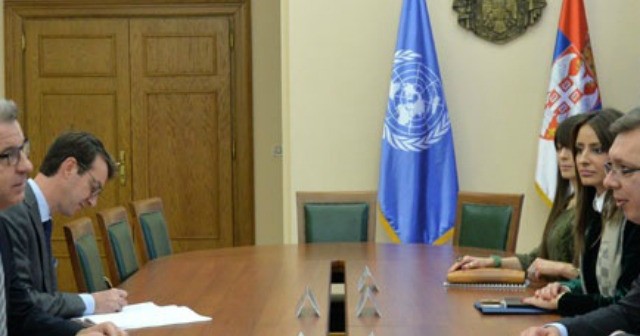Belgrade is refusing to extradite three wanted Serbian Radical Party members to the Hague Tribunal, sparking claims that it’s trying to avoid the UN court hearing how PM Aleksandar Vucic was accused of witness intimidation.
Serge Brammertz, chief prosecutor at the International Criminal Tribunal for the Former Yugoslavia, ICTY, came to Belgrade last week with a clear message: Serbia has to fulfil its obligations and extradite three of its nationals – Petar Jojic, Vjerica Radeta and Jovo Ostojic – to The Hague for trial on witness intimidation charges.
The Hague-based ICTY issued an arrest warrant for the three members of the hardline nationalist Serbian Radical Party in January, but since then Serbia has been rejecting their extradition claiming it is not in line with Serbian law and arguing that it may affect national security.
However Serbia has previously agreed to the ICTY’s requests and extradited its nationals to The Hague over similar issues.
Some observers suspect that the reasons for not extraditing the Radicals are political, claiming that allegations that Serbian Prime Minister Aleksandar Vucic – who was once Radical Party leader Vojislav Seselj’s right-hand man – was involved in interfering with witnesses might be revealed if the case goes to trial.
“The prime minister is maybe afraid of what the three Radicals could say at the trial, as they could reveal his role in bribing and intimidating witnesses, as suggested in the arrest warrants,” Milica Kostic, head of the legal department at the Belgrade-based Humanitarian Law Centre, told BIRN.
Vucic was a member of the Serbian Radical Party and a close ally of its leader Seselj before breaking with him and co-founding the Serbian Progressive Party in 2008.
The alleged witness tampering took place during Seselj’s war crimes trial at the ICTY, when Vucic worked as a legal associate on the defence team from 2004 to 2008.
In the ICTY documents related to the case, the prosecution alleges that several witnesses who it wanted to testify at the Seselj trial were threatened, blackmailed, intimidated and offered bribes to prevent them from taking the stand.
According to an arrest warrant for the three Radical Party members that is included in the ICTY documents, a potential witness referred to only as ‘Witness 4’ was told that “he and his family would be considered ‘traitors’ and would have problems in Serbia if he testified for the prosecution”.
The arrest warrant said that Witness 4 was asked to meet Vucic and Zoran Krasic, another lead associate on Seselj’s defence team at the time. BIRN could not verify whether the meeting took place or not.
As a result, Witness 4 informed the prosecution that “he would not testify due to the significant pressure that had been exerted upon him”.
BIRN contacted Vucic’s office for a comment but received no response.
Since leaving the Radicals, Vucic has denounced the nationalist politics of Seselj and focused his Progressive Party programme on taking Serbia into the EU.
After Seselj returned to Serbia in 2014, when he was temporarily released for cancer treatment by the ICTY, he has repeatedly taunted Vucic and dared his government to send him back to detention in The Hague by force.
Vucic however has rarely commented on Seselj in public, although he has accused the Hague judges of showing a lack of “respect” for Serbia when they raised concerns about non-cooperation with the Hague court.
“Learn to respect Serbia, and only then we will continue to cooperate in line with Serbian laws,” Vucic said in May.
But Milan Antonijevic, the director of the Serbian Lawyers Committee for Human Rights, YUKOM, said that it was not up to Vucic to decide whether the Radicals should be extradited or not.
“It is not his job and he should not deal with this issue. This task is for other institutions. The problem is that those other institutions are silent,” Antonijevic told BIRN.
Shaky legal ground
 |
| Vjerica Radeta, one of the accused, on the far right, with Seselj third from right. Photo: Beta. |
Contrary to its previous decisions in similar cases, the Higher Court in Belgrade ruled in May this year that the three Radical Party members could not be arrested and transferred to The Hague for trial because that would not be in line with the Serbian law on cooperation with the UN-backed war crimes court.
“The arrest warrant for the three people came after Seselj was temporarily released [in November 2014]. It was estimated by the government that their arrest could endanger stability in the country,” said Sasa Obradovic, the Serbian government envoy for cooperation with the ICTY.
But according to Kostic, there are no valid legal arguments for Serbia’s refusal to cooperate with the ICTY and send the accused Radical to The Hague to stand trial for witness tampering.
“Serbia has to cooperate with the Hague Tribunal which was set up by the Security Council on the basis of the Chapter VII of the UN [charter]. That there are no legal arguments is proved by the fact that in at least three identical cases, Serbia didn’t find legal excuses not to extradite people,” Kostic said.
The ICTY has also confirmed that “the Republic of Serbia has indeed cooperated with the Tribunal in the past on matters related to contempt cases, including the arrest and transfer of the accused”.
Those cases include the ones against Ljubisa Petkovic and Dragomir Pecanac, in which Serbia provided the cooperation it was asked for, including arresting the accused and transferring them to The Hague.
Petkovic was sentenced to four months in prison for contempt of court in the Seselj case, while Pecanac was sentenced to three months in the case against former Bosnian Serb Army intelligence chief Zdravko Tolimir.
What next?
 |
| Seselj speaking to the media in Belgrade in March 2016. Photo: Beta. |
The ICTY continues to insist on the extradition of the three Radicals and if this doesn’t happen, Serbia is almost certain to be criticised again at the United Nations Security Council for not cooperating with the Hague court.
The Serbian team for cooperation with the ICTY insists meanwhile that it has done everything in line with the law and that as far as it is concerned, the matter is closed.
It also cites the example of former ICTY spokesperson Florence Hartmann, who was convicted of contempt of court, but her home country France always refused to extradite her to The Hague.
Analysts at home are warning meanwhile that the power that the ICTY once had over Serbia has been waning and that Belgrade is taking advantage of the fact that the UN court will close its doors next year.
Previously, any non-cooperation with the Hague Tribunal had huge impact on Serbia’s EU integration path as the country’s negotiations with Brussels have been halted on several occasions until full compliance has been achieved.
But cooperation with the ICTY is one of EU’s key demands in Serbia’s recently-opened negotiations on Chapter 23 of European legislation, which deals with the rule of law, although its recent non-compliance has not yet been officially flagged up as an issue by the EU.
However, some observers told BIRN that this will be raised in Serbia’s upcoming EU progress report, expected this month.
Antonijevic warned that Serbia could suffer the consequences of not extraditing the three Radicals to face contempt charges.
“This could put Serbia’s further progress [towards]EU accession in jeopardy. This is not a political question, it is an issue of responsibility for what has been done,” he said.
Meanwhile, Seselj and his three party allies remain active in political life in Serbia.
Seselj and Radeta have been members of the Serbian parliament since elections in April, while the Radical Party chief has also announced he will run for the presidency despite the fact his war crimes case has gone to appeal in The Hague after he was acquitted earlier this year.
The Radicals advocate that Serbia should permanently stop cooperating with the ICTY, and Radeta openly mocked Hague prosecutor Brammertz after he arrived in Belgrade last week.
“I heard Brammertz came for us. Since we are not going to The Hague voluntarily, he will have to catch us,” Radeta wrote on Twitter on Thursday.
Radeta also told BIRN that the Hague Tribunal was a “story that is over” and accused Brammertz of seeking to prolong the court’s life so he could keep on “getting a good salary”.
“But it is not a concern of ours. The Hague will not open new cases and no Radical will turn himself in to it,” she said.
However another option would be for Serbia to prosecute the three Radicals at home, as it can do so according to the country’s criminal law.
“The Radicals have spoken publicly about how they would like this trial to be held in Serbia. So our politicians’ story that there is the will to have a trial or an extradition, but not the possibility, is farcical,” Kostic said.
“If they really cared about the rule of law, as they claim, these three people would have already been prosecuted before a local court,” she added.
Vojislav Seselj declined to comment for this article.





